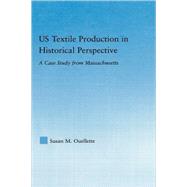- ISBN: 9780415979887 | 0415979889
- Cover: Hardcover
- Copyright: 11/30/2006
For the last three decades, social historians who studied early America expanded older interpretations of colonial economy and society to include family, social position and gender as legitimate topical themes. During that same period, economic scholars have used social historians' community and household studies to explore rural self-sufficiency, the development of commercial agriculture and the Atlantic sea trade. Despite the recent use if family household economics to explore and explain colonial economy and society, most have entirely neglected one of the most fundamental early American industries: domestic textile production. Colonial historians have previously used information about wool, flax and hemp in broad based arguments about the productive side of the colonial economy, yet few have considered textile production a significant colonial economic activity. As a result, textile-producing networks, construed as either economics or social phenomenon, have largely gone unnoticed. This study drawsfrom a broad array of sources including the probate inventories of Essex and Suffolk County, Massachusetts, extant account books, trial transcripts, court records and material culture. Combined with a working knowledge of cloth-making, those records reveal that domestic textile production was a major form of social organization, especially in early Massachusetts. Textile-reproducing networks clearly served to draw households, neighborhoods and regions together in particular ways. From the processing of fibers to the finishing of cloth, intense cooperation and an extensive system of corporate labor were key elements of textile production. Simply put, no one gender or age was responsible, rather a confluence of females and male as well as young and old laborers were necessary to the ensure the success of the industry.







